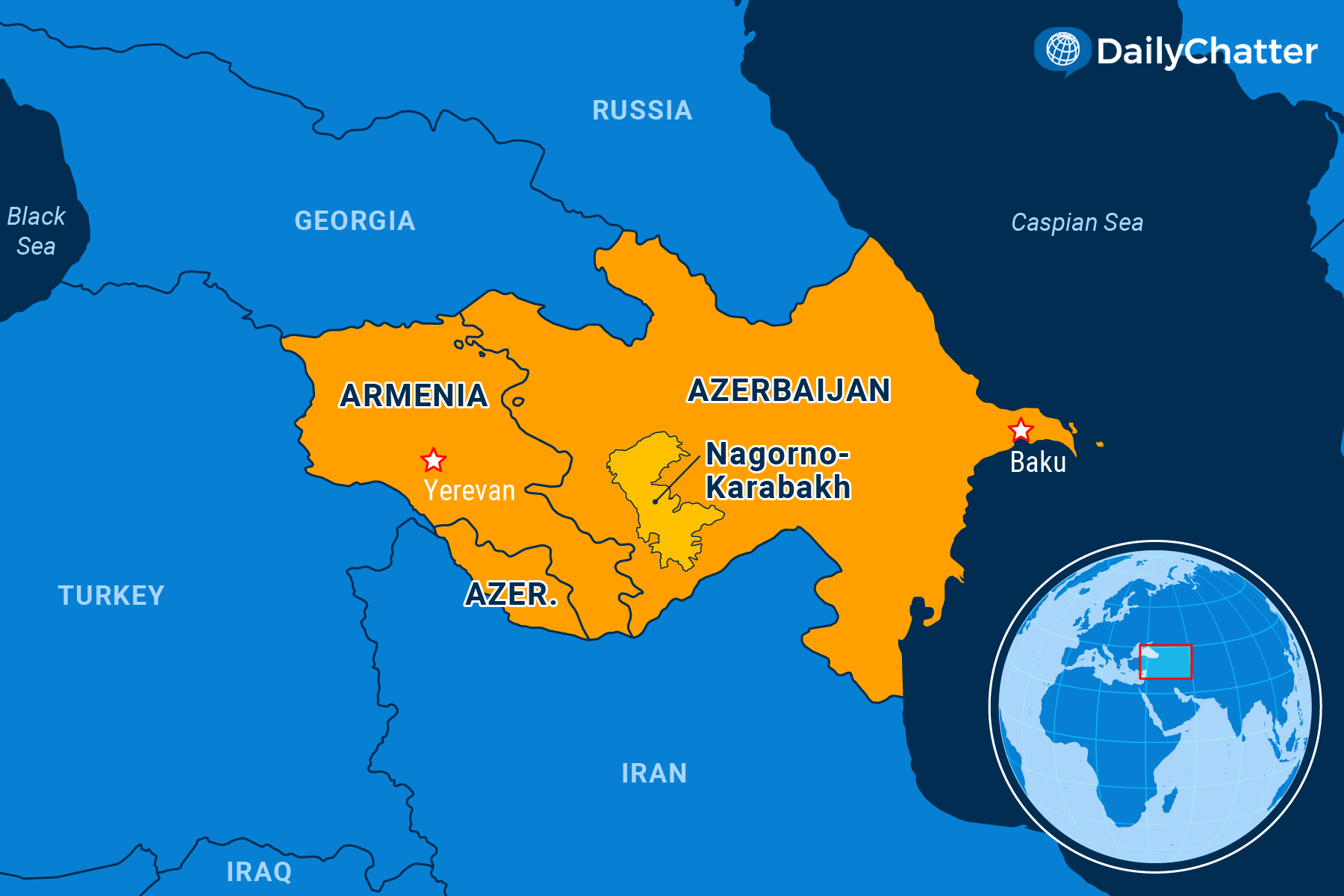Need to Know
September 27, 2023Despair in the Black Garden
ArmeniaAzerbaijan

|
Listen to Today's Edition
|
Another nightmare appears to be unfolding on the far edge of Europe.
Thousands of ethnic Armenians over the past week have fled the enclave of Nagorno-Karabakh after Azerbaijani forces seized the territory, seeking refuge in the nearby republic of Armenia.
Armenian officials, meanwhile, say Azerbaijan is “ethnic cleansing” the enclave of the 120,000 ethnic Armenians that reside in Nagorno-Karabakh: Armenians are Christian, while Azerbaijanis are Muslim. The charge was noteworthy because Armenians are said to have suffered the first genocide in the 20th century under the Ottoman Empire.
“That’s happening just now, and that is (a) very unfortunate fact,” Armenian Prime Minister Nikol Pashinyan told the BBC.
Azerbaijani forces triggered the crisis in the enclave when they “routed” Armenian soldiers in a 12-hour blitz last week and occupied Nagorno-Karabakh, the Associated Press explained. Armenian separatists in the enclave put down their weapons and agreed to negotiate the territory’s “reintegration” into Azerbaijan, which the region officially belongs to.
This is just the latest conflict over the enclave, which was established in 1923 by the Soviet Union as an “Autonomous Oblast” within the Azerbaijan Soviet Socialist Republic – even as it was 95 percent Armenian.
After the USSR collapsed in 1991, the long-simmering ethnic tensions between Armenia and Azerbaijan caused a cycle of wars, refugees and killings – for example, 30,000 people died in two outbreaks of violence in the early 1990s before a ceasefire took effect in 1994 that left Armenia in control of the enclave. It lasted more than 25 years, until intense fighting broke out in 2016 and again in 2020.
After 2020, Azerbaijan held most of the enclave. An agreement established the Lachin Corridor, a small strip of land connecting Armenia to Nagorno-Karabakh and monitored by Russian peacekeepers.
But the corridor has been repeatedly blocked since December, first by Azerbaijani activists protesting environmental harm and later by Azerbaijan, whose officials said the closures were due to security concerns. That led to severe shortages of food, fuel and medicine and what aid officials termed “a humanitarian crisis” earlier this year, CNN said.
After agreeing to open the corridor to aid groups earlier this month, Azerbaijan made its move to recover its territory, saying it wanted to “neutralize” Armenian military installments, the Council on Foreign Relations wrote. Now it controls all of it.
Turkish President Recep Tayyip Erdogan, who has supported Azerbaijan, congratulated Azerbaijani President Ilham Aliyev and the country’s armed forces on their swift victory, the Guardian noted. Turkish drones in particular were key to Azerbaijan’s victory.
Russia has traditionally been Armenia’s most important ally. Armenian officials, for example, said that Russian troops would help protect the thousands of refugees fleeing Nagorno-Karabakh for the Armenian Republic. But as Azerbaijan tightened access to the area, Russia did little and its soldiers did nothing.
As a result, Pashinyan has become highly critical of Russia, added CNN. Armenia is a member of the Collective Security Treaty Organization, a NATO-like military alliance that includes Russia as well as Belarus, Kazakhstan, Kyrgyzstan, and Tajikistan. But the group is not really helping Armenia, argued the prime minister.
Instead, the New York Times described Russia as a “distracted spectator” in the conflict between Armenia and Azerbaijan due to the war it’s now fighting in yet another ex-Soviet republic – Ukraine. Russia simply no longer has the “oomph” to impose its will on the so-called “near abroad” countries on its borders that comprised the Soviet Union.
Because the interests of Russia, Turkey, and neighboring Iran overlap in the region, the West is therefore also interested in developments there. For example, France has been vocal about its worries over Armenia’s territorial integrity, accusing Azerbaijan of threatening its neighbor’s borders. The US has been busy over the past year trying to wrangle a diplomatic solution to the lingering tensions.
Now, analysts warn that the war and the humanitarian crisis could further destabilize the region as the Ukraine war rages, Vox reported. It is already destabilizing Armenia. This week, protestors have taken to the streets, accusing the government of failing to protect ethnic Armenians. They are calling for Pashinyan to resign.
Meanwhile, Azerbaijan now has the upper hand and could threaten military action against Armenia to ensure its access to its other enclave, Naxcivan, according to Stratfor. If it does, it’s unlikely any other country will come to Armenia’s aid.
For Armenians, that’s nothing new.
That’s because they live in a region where “ghosts of the past stalk every living resident,” wrote David Ignatius in the Washington Post, “the Armenians … were isolated and vulnerable – waiting for foreign deliverance that never came.”
As it was in 1915. And in 2023. And probably in the future.
______________________
News from experts
DailyChatter prides itself on the diverse global sources we use to prepare this newsletter for you each morning. One of our most trusted sources is The Conversation, the leading non-profit organization in America for bringing deeply researched information from experts at universities around the country and world to a wider audience. We cite them often in DailyChatter and now we are proud to be partnering with The Conversation and to be able to offer you the chance to subscribe to one of The Conversation’s free newsletters. We encourage you to sign up for in-depth and thoughtful coverage of business, politics, and science.
Not already a subscriber?
If you would like to receive DailyChatter directly to your inbox each morning, subscribe below with a free two-week trial.
Support journalism that’s independent, non-partisan, and fair.
If you are a student or faculty with a valid school email, you can sign up for a FREE student subscription or faculty subscription.
Questions? Write to us at hello@dailychatter.com.

